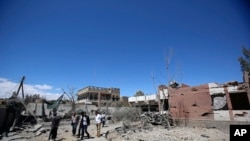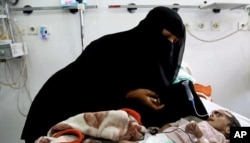The U.N. human rights office has released its latest figures on civilian casualties in Yemen, showing more than 3,500 people have been killed and nearly 6,300 wounded since Saudi Arabia’s bombing campaign against the Houthi rebels began in March of last year.
These figures are being issued amid an international firestorm regarding Saudi Arabia’s responsibility for the high number of civilian casualties in Yemen, particularly child deaths.
Human rights groups have denounced the removal of Saudi Arabia from the U.N.’s annual child rights blacklist. U.N. Secretary-General Ban Ki-moon, who has come under a barrage of criticism, reacted angrily to what he called “unacceptable” undue pressure from Saudi Arabia. Saudi U.N. Ambassador Abdallah al-Mouallimi reiterated his denials that Riyadh threatened Ban over the blacklist.
The ambassador, said, quoting,“It is not in our style, it is not in our genes, it is not in our culture to use threats and intimidation."
Ravina Shamdasani, a spokeswoman for the U.N. human rights office, says her organization stands by its figures on civilian casualties, which show that three-quarters of the deaths and injuries are due to Saudi coalition airstrikes.
“The methodology that we employ in gathering these civilian casualties is in line with our very strict human rights methodology," she said. "Where we are unsure whether somebody is a civilian or a combatant, that person is not counted in our total account. And, then there are some parts where we just do not have access for security concerns. So the numbers that we collect are the bare minimum in fact.”
Heavy toll among children
A report issued by the U.N. Children's Fund on March 29 finds more than 900 children have been killed and more than 1,300 injured over the past calendar year.
The U.N. human rights office condemns a series of rocket and mortar attacks against several residential areas and markets that took place in the city of Taiz between June 3 and 8. Shamdasani says 23 civilians were killed and 77 injured, including children.
“In the overall count of civilian casualties, that is still the case that airstrikes have resulted in more deaths than other types of hostilities; however, in the last week, in fact, it was attacks that were launched by the al-Houthis that led to all of the civilian casualties.”
Shamdasani says the U.N. rights office often faces pressure from states that do not like what it is reporting and that some have threatened to cut off funding. While that certainly would affect its work, she says such threats do not hold back the agency from reporting on human rights violations.





